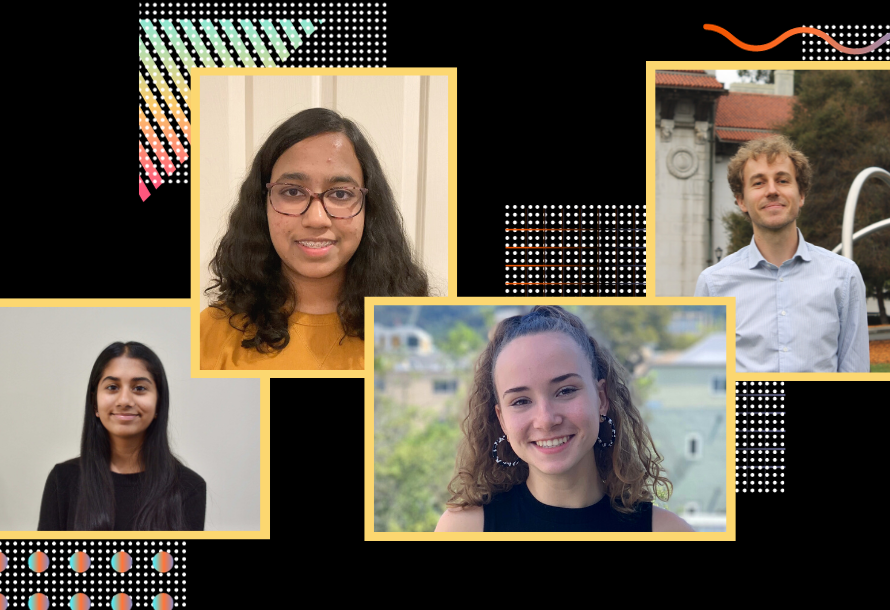Meet the students and researchers pushing the frontier of quantum information science and technology
It’s an exciting time to build and study quantum computers. With different prototypes being explored across the board, advancements in materials, instrumentation, and engineering are paving the way for a completely different way to compute information. And although the state of technology is still early-stage, there are many opportunities for professional growth and development.
The Advanced Quantum Testbed at Lawrence Berkeley National Laboratory (Berkeley Lab) brings together physicists, engineers, science professionals, and students from multiple backgrounds to advance the fast-moving field of quantum information science (QIS) and technology. Funded by the U.S. Department of Energy Office of Science Advanced Scientific Computing Research (ASCR) program, AQT’s quantum computer is based on superconducting circuits, one of the leading QIS technologies.
New generations of students and researchers are being trained every day at AQT to leverage superconducting quantum electronics and processors, quantum algorithms and simulations, and so much more. The testbed user program provides complete access to all levels of quantum processing experiments and hardware for deep collaborative research, opening more opportunities for the sharing and dissemination of knowledge with the broader research community. Three students and a former postdoc researcher shared their testimonials about working in AQT’s collaborative atmosphere.
Studying Quantum Computers Opens New Doors
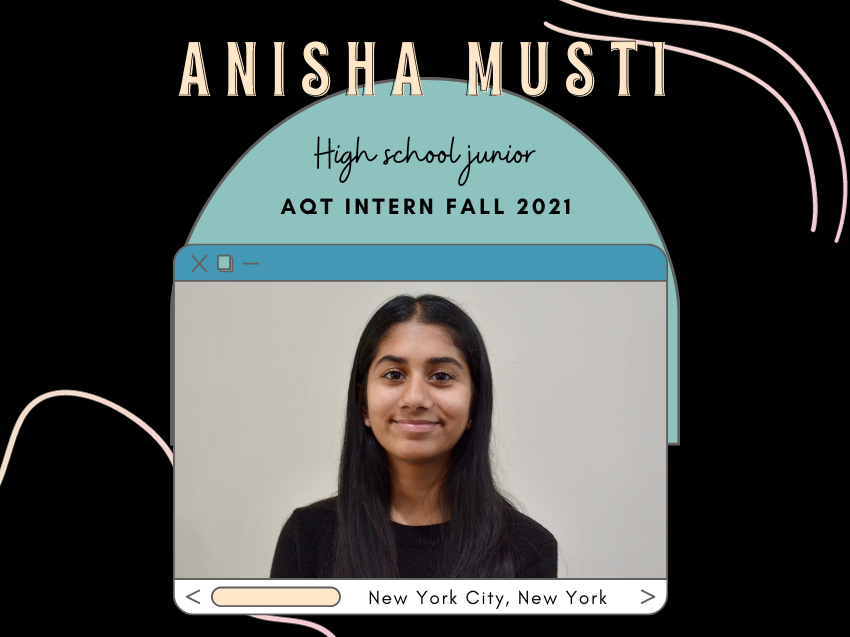
Junior – 11th grade
Edgemont Junior-Senior High School
New York City, New York
AQT intern Fall 2021
Anisha Musti, a junior at Edgemont Junior-Senior High School in New York City, had been learning about quantum programming in her spare time. For a while now, she took it upon herself to learn quantum information science theory and simulations. However, Musti couldn’t grasp some of the nuances in the fundamentals. Deciding to take her self-studies to the next level and get involved in experimental work, she came across AQT after an online search for testbeds open to the community.
Q. What in particular inspires you about quantum information science and technology?
Musti: I’m excited to see the various ways that quantum information science influences existing fields. Already, tech giants are creating quantum divisions to explore the possibilities of this technology. In addition, academia and industry are exploring applications in AI, cryptography, healthcare, and newer sectors. Quantum can potentially impact these fields and several others in significant ways. I’m excited to see which fields those will be and how they will improve our lives.
Q. How has your experience been at AQT?
Musti: My time at AQT has been surreal. I reached out to the AQT staff because I wanted to work on higher-level projects and further my knowledge in quantum computing. For example, I was able to install a piece of hardware onto a dilution fridge – something I couldn’t have imagined doing just a week prior. In the lab, I’m able to learn about simulations and visualize their applications in an experiment. As a result, I’ve gained a deeper understanding of quantum computing.
Q. Your advice to other high-school graduates that might be interested in getting involved?
Musti: It’s never too early to start! I was worried that it would be impossible to grasp any concepts in quantum information science for a long time. I was also concerned that even if I could understand the concepts, I thought I wouldn’t do anything meaningful. Although quantum is a deep concept, you can start learning as much as you can now, and you definitely can implement something! After diving deeper into quantum and the community, I’ve met many high-school students interested in the field. Some students have made a significant impact before they even graduate. If you have any doubt, I say: go ahead and give it a try.
Q. Looking ahead, what are your goals after spending time at AQT?
Musti: There are still many basics in quantum theory that I don’t understand. Although they are called “basics,” they are not simple and require a lot of research and reading. It was difficult for me to implement solutions without understanding these basics. However, I look forward to continuing my learning and eventually developing a solid understanding of these concepts. I’m planning on going to college for a degree in physics and computer science. Depending on my employment opportunities, I will attend grad school as well. AQT has reinforced my belief in this path. After meeting so many passionate physicists, I know this is what I want to pursue.
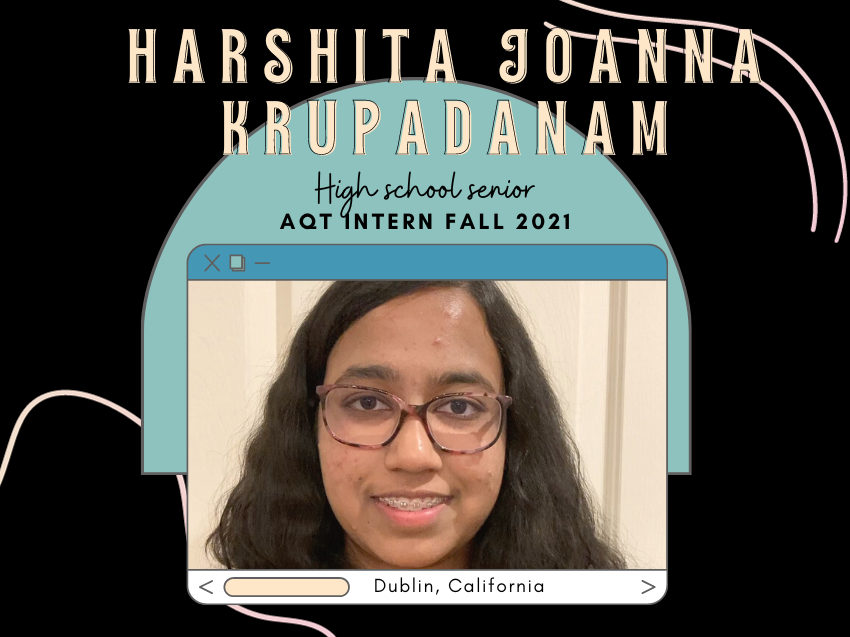
Senior – 12th grade
Quarry Lane School
Dublin, California
AQT intern Fall 2021
Harshita Joanna Krupadanam, a high school senior at Quarry Lane School in Dublin, California, has always been interested in physics as a fundamental science. She took physics classes during all four years of high school at the highest levels. During her studies, she was intrigued by the theory of quantum mechanics.
In 2020, Krupadanam attended the ATLAS Masterclass at Berkeley Lab for high school students. She received introductory lessons in particle physics and the experiments at the Large Hadron Collider (LHC) in Switzerland. This experience sparked a further interest in quantum science and engineering. She later found out about the opportunity to conduct a summer internship at AQT through a graduate of the University of California, Berkeley.
Q. What in particular inspires you about quantum information science and technology?
Krupadanam: During my time in high school, I have been conducting research work on computational cancer drug discovery. While doing this research, I learned that quantum computing could solve the most computer-intensive problems quicker, such as molecular geometry optimization.
Q. How has your experience been at AQT?
Krupadanam: I enjoyed being able to participate in the work being done by the AQT. I was able to contribute to the programs used to calibrate a quantum chip. This was immensely satisfying to me. The interactions with the AQT research team and the Quantum Nanoelectronics Lab at UC Berkeley helped me understand the work being done in the field. As this was my first time working in a research lab and in a cutting-edge field, developing the background knowledge and understanding was the most challenging part. However, my AQT mentor, Marie Lu, and the staff supported me through the entire process.
Q. Your advice to other high-school graduates that might be interested in getting involved?
Krupadanam: I highly encourage high school students, especially girls, to take up physics. It underpins all technologies that have made our modern world possible. For this reason, I started the Bay Area Physics Circle program and have taught high school physics over the past two summers to students from 17 area schools. This year, AQT researchers gave special talks to the students on their work. I hope to persuade many more to explore physics. I am sure, like me, they will enjoy going deeper into the field.
Q. Looking ahead, what are your goals after spending time at AQT?
Krupadanam: In my undergraduate studies, I plan to major in physics or engineering and continue research work in QIS. After that, my goal is to continue to graduate school and become a researcher building quantum computers.
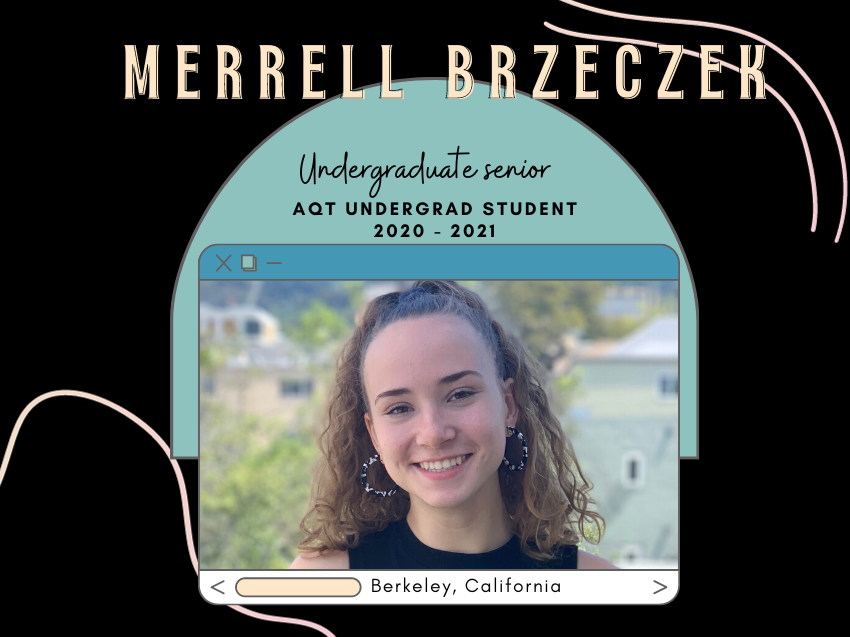
Senior – undergraduate student
University of California, Berkeley
Berkeley, California
AQT undergraduate student September 2020 – May 2021
Merrell Brzeczek, a senior undergraduate student at the University of California, Berkeley, learned about AQT in a class by UC Berkeley physics Professor and AQT Director Irfan Siddiqi. She was intrigued by the direct links between quantum mechanics and quantum information processing. She worked with Siddiqi on her bachelor’s degree senior honor thesis, “Characterization of the Cross Resonance Effect for Transmon Qutrits,” which studied three-state quantum systems. These systems are advantageous for quantum computing because three levels allow more efficient encoding of information. Working with three levels also generates interesting quantum phenomena that do not arise for two-level quantum architectures. Her project developed virtually during the 2020-2021 school year (September-May).
Q. What in particular inspires you about quantum information science and technology?
Brzeczek: Quantum information science inspires me because it is so dynamic. There are constantly new applications for and implementations of quantum information science coming out, and it feels like you are watching the field grow and evolve in real-time. It’s very cool to feel you’re part of something that will impact the future of science, technology, and a myriad of other fields. The newness of this field also fosters a culture of innovation and creativity since there is relatively little set in stone compared to other disciplines. I was first interested in quantum information science simply to implement the concepts I had learned in my undergraduate physics courses. Quantum phenomena like superposition and entanglement were fascinating to me. However, I was always frustrated at how abstract they seemed because nothing was similar at the human scale. For me, quantum information science resolved this frustration by imparting tangible meaning and value to otherwise conceptual ideas.
Q. How has your experience been at AQT?
Brzeczek: I was consistently inspired and driven by so many intelligent people solving problems and asking questions that fascinated me. My work with AQT was my first experience with research, so my biggest challenge was probably adjusting from being a student to a researcher, which meant asking questions and solving problems that we don’t have answers for. The creative and welcoming atmosphere within AQT helped me make this adjustment.
It was also challenging that my project occurred during the pandemic, so I could never actually go into the lab to work or see the setup. However, numerous Zoom sessions and remote logins meant that while this was a challenge to adjust to, it didn’t hold back my progress.
Part of the culture of innovation and creativity within AQT is collaboration. My work could not have been completed without help from numerous other AQT researchers at different points in the project. People are always willing to help with questions or direct you to the right paper to solve your problem. Being part of such a large community with such a range of research interests means that there is always someone whose work can inform yours and vice versa. There is a constant dialogue between the different research thrusts, which is what enables AQT to be such a vibrant and productive research environment.
Q. Your advice to other high-school graduates that might be interested in getting involved?
Brzeczek: Try it! No matter what, you will get to experience a field with doors wide open to creative ideas and be part of shaping the future of science and tech. The worst-case scenario is that you learn a lot and use those skills to pursue a different discipline. The best case is that you find a passion that could change the course of your career. While it may be scary to jump into a relatively new field, I think this newness is a strength of quantum information and tech, as it feels like there’s a world of discoveries waiting right in front of you.
Regarding knowing where to start, I would say to students: begin with your professors. For me, at least, a significant hurdle to beginning research was fear that I was inadequately prepared. However, especially in such a collaborative and supportive community as AQT, you will learn the skills you need during the project. The thing that can’t be taught is passion and excitement, so it’s essential to act on it if you have that.
Q. Looking ahead, what are your goals after spending time at AQT?
Brzeczek: I am currently working toward my doctorate at UC Santa Barbara, so my first professional goal is to complete my degree. As of right now, I intend to continue in academia afterward and eventually become a professor. However, thanks to my work with AQT, I intend to continue working in, or at least adjacent to, quantum information science for the rest of my career. I love that quantum information science bridges the gap between scientifically exciting and technologically useful.
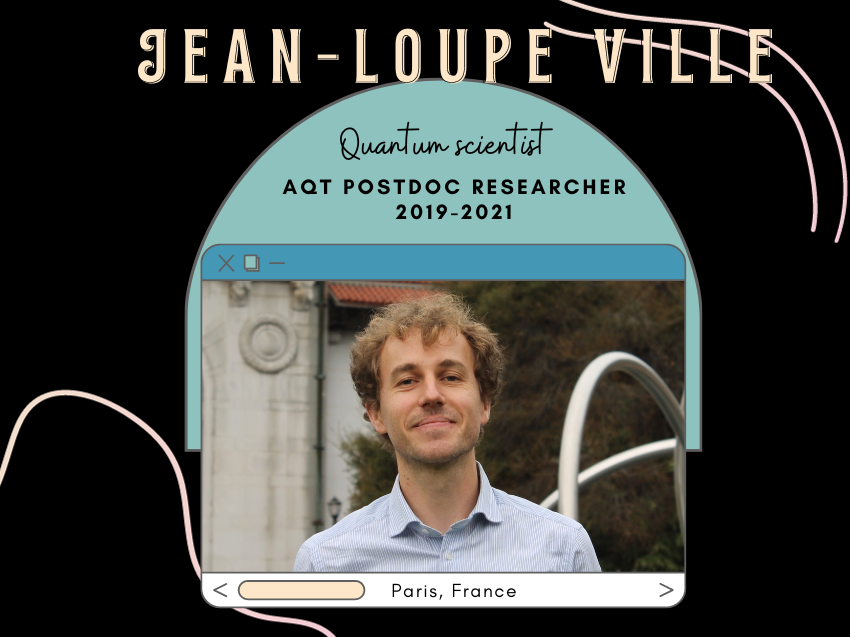
Quantum scientist at Alice&Bob
Paris, France
Former postdoctoral researcher at AQT 2019 – 2021
Jean-Loup Ville is currently a quantum scientist at the Paris-based startup Alice & Bob. Ville arrived at AQT in 2019 as a postdoc researcher via UC Berkeley and his background in cold atom physics in his native France proved different from what was being conducted at AQT, but he soon got interested in its applications for quantum computing. In addition, he was quickly impressed by the quality of the experiments conducted with superconducting qubits at AQT.
After working at AQT for two and half years, Ville has moved on to the startup Alice&Bob. At AQT he worked on a new type of logic gate to improve the connectivity between qubits, thus reducing the algorithms’ length. He’s also worked on implementing a new quantum algorithm and studying error mitigation as quantum processors are still too noisy to make the algorithm work smoothly without mitigation.
Q. What in particular inspires you about quantum information science and technology?
Ville: I like the fact that many people are coming together with a common objective. People outside of academia are also interested in the potential breakthroughs, which makes the community grow a lot and is very good for the field. Furthermore, coming from a quantum gases background, where an experiment is mainly built to study one topic, I liked the idea of building a quantum processor to conduct different simulations. It allows us to separate more different tasks to create a powerful machine capable of other things. From a more pragmatic point of view, it is also great to see so many job opportunities now for quantum scientists.
Q. How has your experience been at AQT?
Ville: I have been part of the AQT since its first years, and I have seen it grow by attending the weekly meetings and interacting with many people. It is interesting to see the many different projects evolve. We also have seminars every few weeks. There are many topics studied at AQT, from materials to new algorithms. This implies many things need to be learned and this can be challenging. For example, trying to get quantum algorithms to give meaningful results is currently a full research area. Because the quantum processors are too noisy, one needs to mitigate the noise, and if possible, in an efficient and scalable way. Discussions with other researchers in the community who are also working on this were very helpful.
Q. Your advice to other high-school graduates that might be interested in getting involved?
Ville: Start to talk to people in the field. The community is growing every day. Most of us are very open to discussions. There are also many free tutorials designed for beginners, which already go into great detail!
Q. Looking ahead – what are your goals after spending time at AQT?
Ville: Working at AQT was a great opportunity. For example, we started the QITE algorithm project after a seminar by Caltech professor Garnett Chan. Chan explained at the time that getting any correct result from a quantum algorithm was already of interest in the field. I also liked the state-of-the-art images of materials provided by the Molecular Foundry at Berkeley Lab. It was amazing to see such exquisite probings of our chips. I will now continue working on the experimental side, which is what I enjoy the most, specifically with cat qubits at Alice&Bob.
💡 Are you interested in quantum computing?
AQT at Berkeley Lab is open for internships and collaboration. If you’re interested in applying for a growing field and joining the team at AQT, submit your information: https://aqt.lbl.gov/contact-us/
Founded in 1931 on the belief that the biggest scientific challenges are best addressed by teams, Lawrence Berkeley National Laboratory and its scientists have been recognized with 14 Nobel Prizes. Today, Berkeley Lab researchers develop sustainable energy and environmental solutions, create useful new materials, advance the frontiers of computing, and probe the mysteries of life, matter, and the universe. Scientists from around the world rely on the Lab’s facilities for their own discovery science. Berkeley Lab is a multiprogram national laboratory, managed by the University of California for the U.S. Department of Energy’s Office of Science.
DOE’s Office of Science is the single largest supporter of basic research in the physical sciences in the United States, and is working to address some of the most pressing challenges of our time. For more information, please visit energy.gov/science.
